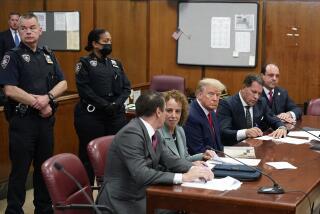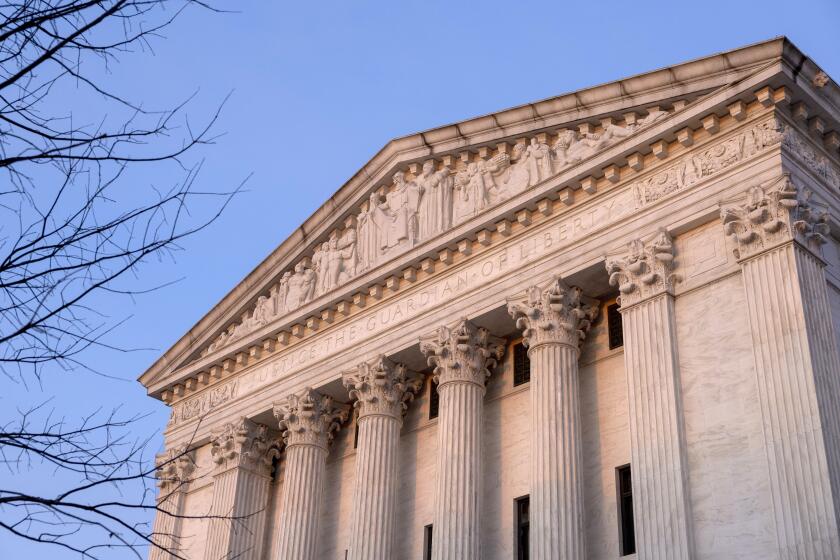Religious Persecution Bill Attracts Converts, Repels Pragmatists
Senate leaders are promising action before Congress ends this fall on long-stalled legislation intended to combat religious persecution abroad. But this seemingly unassailable objective is giving new meaning to the congressional adage, “The devil is in the details.”
Almost all sides in the emotional debate agree that thousands of people around the globe face starvation, murder, rape, kidnapping, imprisonment, forced conversion, slavery and other atrocities because of their religious beliefs.
In Congress and the White House--along with churches, synagogues and other houses of worship across the country--there is a growing consensus that the United States should do what it can to alleviate the plight of people suffering for their faith.
Yet there is almost no agreement on just what Washington can, or should, do about the problem. Proposals to impose economic sanctions have generated strong opposition from the business community and have drawn objections from the administration, which calls such sanctions a blunt instrument that can interfere with other foreign policy objectives. And there is little consensus about other steps that could be used to punish persecutors.
With the Cold War over and the world no longer divided into ideological camps led by the United States and the Soviet Union, religious liberty and its opposite, persecution, are emerging as a new global dichotomy: In one camp are those countries that allow their citizens to worship as they please; in the other are those that do not.
“The freedom to proclaim a religious identity and to practice [it] is an inalienable right of all people,” White House National Security Advisor Samuel R. “Sandy” Berger wrote recently. “When denied, it can sow generations of hatreds--hatreds later harvested in violence, unrest and war.”
But Berger was arguing against a bill that would impose economic and political sanctions on nations implicated in religious persecution, either directly through government action or indirectly by allowing mobs to get away with atrocities against members of competing religions. Berger and other Clinton administration officials--backed by much of the business community and even some church groups--contended that the measure would actually make matters worse by provoking a backlash against the religious groups the bill is intended to protect.
The House approved the bill, 375 to 41, but the legislation has bogged down in the Senate. The House bill--with its heavy emphasis on economic sanctions--is thought to have no chance in the Senate, and a substitute sponsored by Sen. Don Nickles (R-Okla.) is stalled in the Foreign Relations Committee.
Senate Majority Leader Trent Lott (R-Miss.) vows that he will not allow the committee to bury the legislation and says he intends to bring it up soon by employing a seldom-used procedure allowing the majority leader to bypass committees.
“Changes are being made to the bill to make it more acceptable to the business community,” said a Lott spokesman.
But even with Lott’s backing, passage is by no means certain.
The difficulty lawmakers are encountering in their effort to combat persecution is a microcosm of the confusion surrounding the issue in the country at large. Although evidence of religious persecution is overwhelming, it frequently has been overlooked by Americans, who enjoy religious freedom at home.
According to reports compiled by the State Department, religious groups and some secular human rights organizations, persecution is a growing scourge.
“Followers of all of the world’s major religions--Christians, Hindus, Muslims, Jews, Buddhists, Bahais and others--are currently discriminated against, harassed, detained, tortured and killed,” reported the State Department’s Advisory Committee on Religious Discrimination Abroad earlier this year.
Although the martyrs come in all faiths, Christians are the most frequent victims, according to numerous nongovernmental assessments. With 1.9 billion adherents, Christianity is the world’s largest religion, so, statistically, it is the biggest target. Many Christians live as minorities in Third World countries where another religion is dominant.
Fundamentalist groups, led by the Christian Coalition, have mounted a campaign to overcome public apathy and sensitize Americans to the plight of Christian martyrs around the world. The effort initially was greeted by skepticism from liberal religious groups, secular human rights organizations, business associations and the administration.
The bill passed by the House closely tracked the coalition’s objectives, focusing on persecution of Christians, Tibetan Buddhists and Bahai. It targeted China, Vietnam, Sudan, Iran, Cuba, Morocco, Saudi Arabia, Pakistan, North Korea, Indonesia, Egypt and Laos for immediate attention by a newly created White House office of religious liberty.
Critics complained that the measure seemed to give a free pass to countries with appalling human rights records, such as predominantly Christian Serbia, which added the term “ethnic cleansing” to the lexicon of persecution.
The business community, led by the U.S. Chamber of Commerce, complained that the imposition of virtually automatic economic sanctions would hurt U.S. firms abroad while doing very little to combat persecution.
The bill was broadened to cover all forms of religious persecution, regardless of the faith of the victims, before it passed the House. Backers of the anti-persecution effort, now focusing on the Nickles bill, have continued to tinker with the language in an attempt to overcome opposition in the Senate.
The original emphasis on economic sanctions has been changed to an 11-item menu of steps, starting with private diplomacy and escalating to withdrawal of most-favored-nation trade status. It would be up to the White House to pick the appropriate response.
As a result of the changes, support for the bill has widened from its original base in the Christian Coalition and other fundamentalist evangelical groups. The bill is now endorsed by much of the Roman Catholic hierarchy and a variety of Jewish groups and Chinese dissidents. (The National Council of Churches, representing most mainline Protestant denominations, still harbors strong doubts that legislative action will alleviate persecution. But it says the Senate bill is much better than earlier versions.)
Equally important, business community opposition has softened substantially.
Business groups have long opposed almost any form of economic sanctions--including the four-decade embargo of Cuba, restrictions on trade with Iran, the boycott of Libya and, more recently, bans on business with India and Pakistan in response to their nuclear tests. The Chamber of Commerce and other groups say sanctions imposed by the United States without the support of other countries do little to hurt the intended targets but are extremely costly to U.S. firms.
“Our fundamental problem with the legislation is not the objective of eliminating religious persecution,” said Willard Workman, international vice president of the U.S. Chamber of Commerce. “Our problem is reliance on semiautomatic, unilateral economic sanctions to give the bill teeth. Unilateral sanctions don’t work.”
Michael Horowitz, a senior fellow of the Hudson Institute, a conservative research organization in Indianapolis, and one of the early leaders of the legislative campaign, said he and other backers are less interested in imposing sanctions than they are in requiring the government to collect and disseminate information about persecution. If that happens, he said, public opinion will take it from there.
“We don’t want to have sanctions,” he said. “If the issue is on the table, change will take place.”
More to Read
Get the L.A. Times Politics newsletter
Deeply reported insights into legislation, politics and policy from Sacramento, Washington and beyond. In your inbox three times per week.
You may occasionally receive promotional content from the Los Angeles Times.






